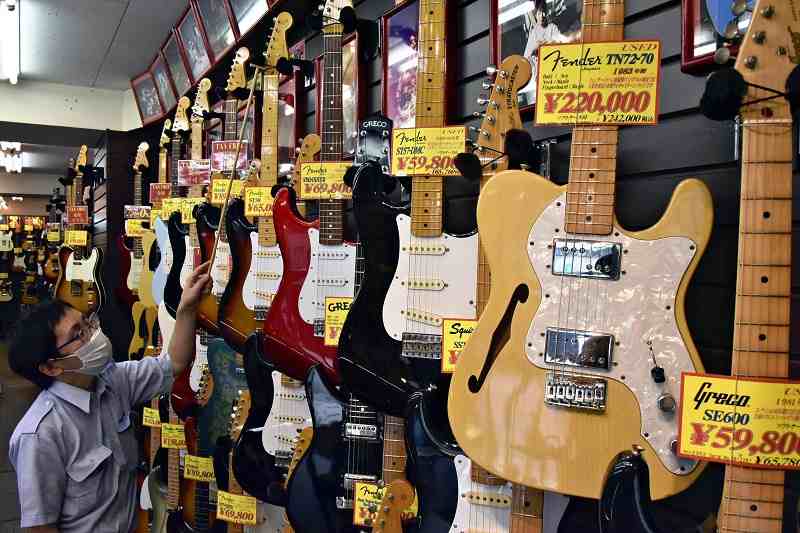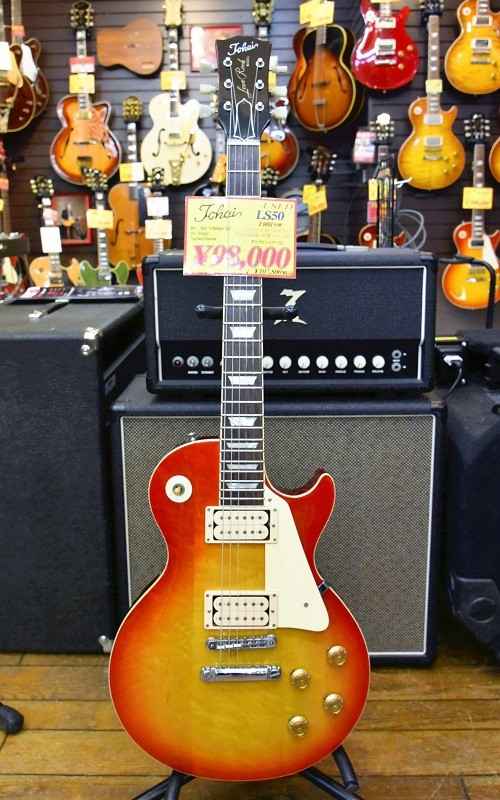Popularity, prices soar for vintage domestic electric guitars

Used electric guitars made in the 1970s and 1980s line the wall at Shimokura Second Hands in the Ochanomizu district of Tokyo.
11:06 JST, August 22, 2022
Yuta Tanaka is as surprised as anyone. While the pandemic wreaks havoc in a wide range of businesses, the used guitar shop in Tokyo where he works and others like it are singing a happy tune.
“The popularity of Japan Vintages is astonishing,” said Tanaka, referring to the electric guitars domestically produced decades ago that are copies of famous U.S. brands. “I believe prices will further go up.”

A used Tokai Gakki guitar is now twice the price as when it was manufactured in the early 1980s.
Tanaka is a 41-year-old employee of second-hand guitar store Shimokura Second Hands, located in the Ochanomizu district in Tokyo’s Chiyoda Ward, famous for its many musical instruments stores.
I ventured there recently to find out what is driving the demand among enthusiasts that is causing the instruments to suddenly as much as double in price.
The hottest sellers are the electric guitars produced by Japanese manufacturers in the 1970s and 1980s that were copies of such famous U.S. brands as Fender and Gibson.
As their popularity has grown, so have the prices. Shimokura Second Hands said that last year it got in stock a Japan Vintage guitar manufactured in the early 1980s by Hamamatsu-based Tokai Gakki Co. The guitar retailed at that time for ¥50,000, and the store sold it at the end of July this year for about ¥110,000.
Other guitar shops in the area are experiencing the same situation, and are even receiving a flood for inquiries from overseas customers.
Fine attention to detail
The secret to the new-found acclaim for the guitars is the quality of the materials and the craftsmanship of the manufacturers.
Takeshi Hirai, 52, an editor of guitar-related books at Shinko Music Entertainment Co., a music publisher in Chiyoda Ward, and others said a generous amount of high-quality wood that today is highly sought after was used back then in the making of instruments.
In addition, the craftsmen at Japanese manufacturers at that time were extremely fussy about such details as bonds and the precision of metal parts, resulting in many products of a quality higher than their price reflected. Japanese craftsmanship produced guitars that were nearly equal to the originals.
However, it all began to go downhill when U.S. manufacturers started filing lawsuits against the Japanese manufacturers, citing “infringement on their business interests.” From then, the copy industry died out.
From the beginning, the copies drew high marks as “good quality for the money.” But with guitars seen as something that could be enjoyed indoors during the COVID-19 pandemic, it has only been recently that overseas buyers have taken notice of the old Japan-made electric guitars.
A look at overseas sales websites shows products that are often priced higher than in Japan. “Prices in Japan are rising, driven by overseas price hikes,” a music store staffer said.
Skepticism of high prices
However, there are some in the business who are skeptical about the situation.
“I wonder if the old guitars are worth that price,” said Shohei Adachi, 64, chairman of Tokai Gakki Co. “We have always been very particular about the details, but today’s guitars have a higher precision. The prices of old guitars have risen too high.”
A staff member at guitar manufacturer Fujigen Inc. of Matsumoto, Nagano Prefecture, which was also contracted to make many of the Japan Vintage guitars, says it is all a matter of choice.
“Honestly speaking, it is nice to see guitars we made still being appreciated,” said Ryota Yamazaki, 43. “But in the end, it is a musical instrument, and the most important thing is whether the player likes it. I want them to give [several] a try and get the one they like.”




